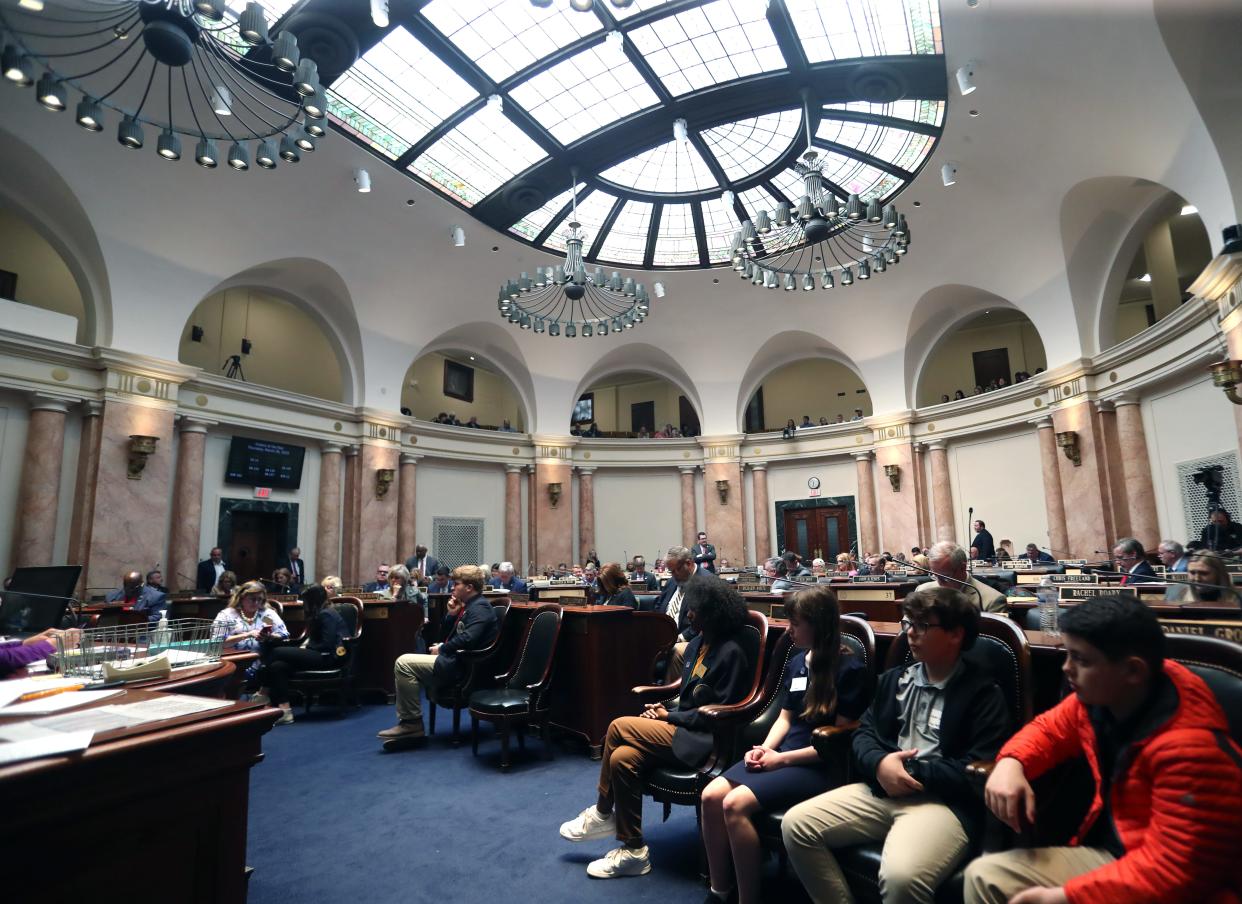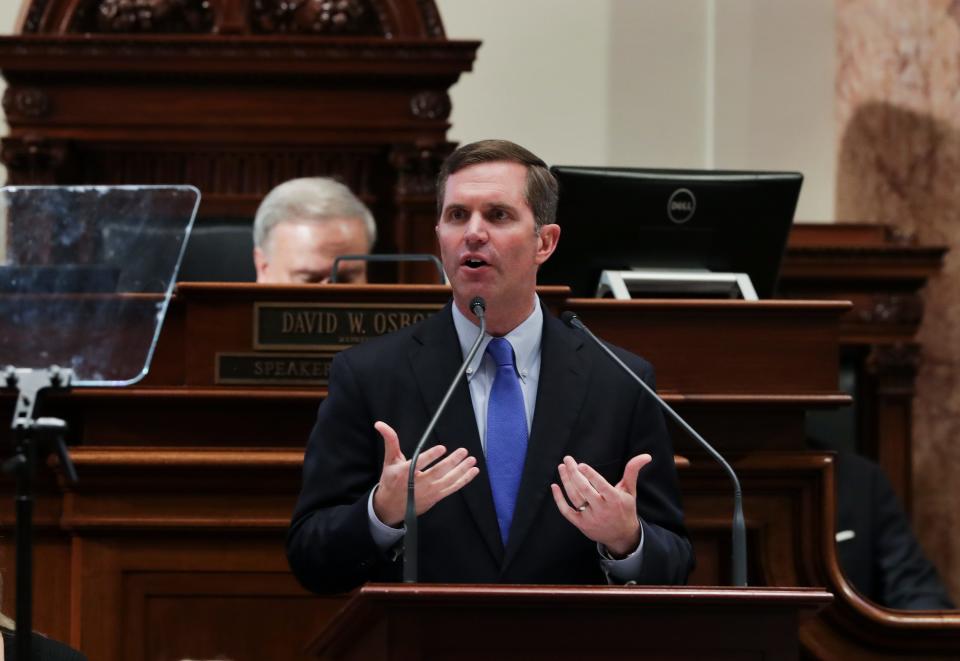Kentucky General Assembly 2024: Here are the key issues to expect

- Oops!Something went wrong.Please try again later.
In his budget proposal, Gov. Andy Beshear outlined what he hopes Kentucky legislators act on in the 2024 General Assembly, set to begin Tuesday.
But with a Republican supermajority in the House and Senate, lawmakers may have other priorities. Beshear, who won reelection in November, is the lone Democrat in a statewide office in Kentucky.
While the state's Legislative Research Commission no longer lists prefiled bills on its website, versions of some legislation that may be on the table are already in play.
Republican lawmakers, for instance, recently unveiled a 68-page bill aimed at public safety, and it's safe to expect action on education and several other notable topics.
Speaking last week with The Courier Journal, Beshear expressed optimism that some House and Senate priorities align with his.
He's had early discussions with legislative leaders, he said, and "the tone and tenor of them right now have been very good." Bipartisan bills passed last year concerning medical marijuana and sports betting should stand as proof that the two sides can work together to pass popular legislation, he added.
Still, Beshear vetoed more than a dozen bills passed by the House and Senate last year, and the Republican supermajority overrode him each time. Disagreements will happen — and with a lengthy 60-day session that will last into the spring, decisions legislators make this winter can have an impact in Kentucky for a long time.
Here's a look at some of the key issues facing lawmakers:
The budget
"In a budget session, most of what you want to accomplish from the executive side is in that budget," Beshear said the day after his proposal was unveiled.
Those priorities include $11 pay raises for all public school employees and universal preschool services for all 4-year-olds — two policies he promoted on the campaign trail throughout the year.
Other notable investments in the 220-page document released last week include an influx in funding for student transportation, renovations and additions to the state's juvenile detention centers and $500 million for Kentucky's Cleaner Water Program.

The rollout of Beshear's budget proposal illustrates the frequent disconnect between the governor and Republican lawmakers.
In 2022, House leaders unveiled their budget plan before Beshear's was released, listing their priorities before the governor could weigh in, a move Democrat leaders blasted at the time as "beyond petty." In response, Beshear said he unveiled his $136 billion plan earlier than usual this year to ensure his feedback could be included.
"My goal here is to have the very best initial budget that we work off of," he said.
How those priorities align with Republicans in the legislature, though, is a tougher question. And while the executive budget is typically used as a key reference point, it's ultimately lawmakers who put together the budget that lands on the governor's desk for approval.
House and Senate Republican leadership offered no reaction to Beshear's proposal.
Public safety and gun legislation
GOP legislators have made at least one thing clear: They intend to push legislation they believe would make Kentucky safer.
Outgoing Attorney General Daniel Cameron, Beshear's opponent in the gubernatorial race, made crime prevention a central point of his campaign. The public safety plan he released in July included several provisions that made their way into the draft legislation put forward by Louisville-area Republicans earlier this month and is expected to be reviewed in the General Assembly.

Rep. Jared Bauman, R-Louisville, is behind the wide-ranging bill, with a blueprint released in September and a revised draft released earlier this month. The latest version, dubbed the "Safer Kentucky Act," calls for a number of stricter laws, including:
Life in prison for individuals convicted of three separate violent felonies;
The possibility of the death penalty for people convicted of murder of a first responder, including a police officer;
Specific charges for carjacking, classified in the bill as a Class B felony;
Limiting the amount of money charitable bail organizations can put up for defendants, and limiting which defendants they can support;
Allowing business owners to use force to detain suspected shoplifters and recover goods that were taken;
Banning street camping while allowing local governments to designate certain defined areas temporary camping locations;
Requiring school employees to contact police if they know of threats or plans of violence targeting a school or students, or are aware of a firearm on school property;
Tougher penalties for people convicted of selling fentanyl to an individual who later dies from an overdose, and for people found guilty of smuggling contraband into a prison.
At a Louisville Forum event in December, Bauman (set to take part in his second General Assembly after taking office at the start of 2023) called the bill his "top priority," as public safety is foundational to support families, education and the economy.
"Our foundation in Kentucky and Louisville is broke right now, and we must repair it," he said. "We need to hold criminals accountable for their actions, and that's what we're going to do with the Safer Kentucky Act."
It has clear support among some GOP members. When Bauman unveiled the draft bill earlier this month, Reps. Jason Nemes and Kevin Bratcher, fellow Louisville Republicans, joined him. And Cameron, in a December social media post, said he hopes the bill passes.
Bauman said its backers "worked very closely with (Democratic Louisville Mayor Craig Greenberg's) office in helping with the policy, so I certainly think that we will pass it in a bipartisan way."
But it's drawn concern from critics who believe it criminalizes homelessness and puts too much emphasis on punishment for criminal activity and not enough on crime prevention.
Rep. Nima Kulkarni, D-Louisville, told Louisville Forum attendees that toughening criminal penalties often does little to address "the root causes of incarceration," including people arrested for low-level drug and property offenses.
"I understand the push towards public safety. I think everyone here can agree we want our city to be safe, we want our community to be safe. I think you're not going to find disagreement there," she said. "But are we going to get there by putting more and more people in jail? Because that is costing us hundreds of billions of dollars as a nation, and Kentucky is right up there."
For his part, Beshear told Cincinnati-based Local 12 he needs to see the full bill, rather than a draft, before offering his opinion, but it's "something I'll take a look at."
While the Safer Kentucky Act will look to cut down on violent crime, a separate bill from state Sen. Whitney Westerfield, R-Crofton, and Sen. David Yates, D-Louisville, will push to temporarily take guns away from people dealing with a mental health crisis.
That legislation, dubbed the Crisis Aversion and Rights Retention bill, went before a legislative interim committee earlier this month, where survivors of the 2023 mass shooting at downtown Louisville's Old National Bank filled the crowd in support. But questions remain on whether the bipartisan legislation will find an audience in the General Assembly.
Westerfield told the committee the language in his bill has not yet been finalized, as he seeks additional feedback and input. But Nemes and Rep. Savannah Maddox, R-Dry Ridge, expressed concerns that the bill would violate gun ownership rights entrenched in the U.S. Constitution.
Education
Several education-based bills are also expected to be heard during the session.
A Kentucky judge recently struck down a 2022 law that would have allowed funding for charter schools, saying the law would have created a "separate but unequal" system of publicly funded but privately controlled schools. But GOP lawmakers are still pushing for a school-choice constitutional amendment to appear on next year's ballot, altering language related to common schools. If passed, the legislature could take another crack at school choice in the 2025 session.
Rep. James Tipton, R-Taylorsville, recently told The Courier Journal he's hoping to draft a bill aimed at improving math education in Kentucky, while Beshear's budget calls for raising salaries for teachers and other public school employees.
Abortion
Abortion legislation has a chance at coming to the table, as well. The procedure is currently outlawed in Kentucky in nearly all cases after the fall of Roe v. Wade last summer, but an Emerson College Polling Kentucky poll this fall found 55% of Kentucky voters oppose the lack of exceptions in current laws, with just 28% in support.
It was a hot topic this year on the campaign trail. Beshear put the issue at center stage with an ad spotlighting a Kentucky woman who miscarried while in middle school after being raped by her stepfather and was critical of Cameron's inconsistent stance. The commercial drew national attention, and Beshear went out of his way to thank the woman, Owensboro native Hadley Duvall, during his victory speech for speaking out.

At the Louisville Forum event this month, GOP Rep. Ken Fleming said the topic of abortion exceptions had come up at a Republican caucus retreat after the election, where there were "a lot of very honest, straightforward conversations that we had" about the topic.
"I know there are some things in the works. To what degree, I don't know, but there has been a lot of discussions in terms of trying to address that issue," Fleming said. "I think it became pretty clear not only in other parts of the United States but also here in Kentucky that there was definitely a message that was sent. So, I think at least on our side, on the Republican side, we're taking that very seriously, and we're having some good conversations about that."
Lawmakers from both parties have publicly expressed optimism the 2024 General Assembly will provide legislation that supports Kentuckians of all parties, and a budget that benefits the entire state.
But state Sen. Gerald Neal, D-Louisville, told forum attendees that issues are connected — small legislative changes on topics like education and the budget can affect millions of people, and it's important for lawmakers to remember "we're in this together." And with Republicans setting the table as they remain in the driver's seat in the House and Senate, their decisions will impact all of Kentucky.
"I like the word 'bipartisan' and I do agree that we pretty much agree on most things together," he said. "But the reality is whoever sets the agenda is going to ultimately determine the outcome."
Education reporter Krista Johnson contributed. Reach Lucas Aulbach at laulbach@courier-journal.com.
This article originally appeared on Louisville Courier Journal: Kentucky General Assembly 2024: What to expect in legislative session

